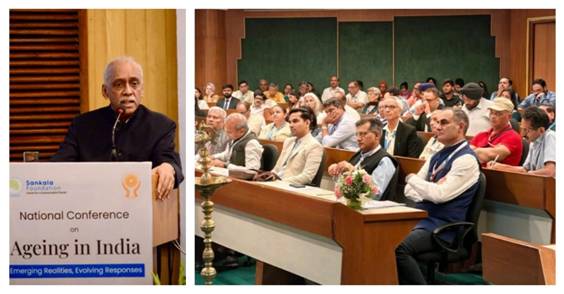Our Terms & Conditions | Our Privacy Policy
NHRC Conference Calls for Culturally Rooted & Globally Adapted Elderly Care Policies in India
New Delhi– The National Human Rights Commission (NHRC), in collaboration with NITI Aayog, the Ministry of Social Justice & Empowerment, and the Ministry of Health & Family Welfare, supported a day-long National Conference on “Ageing in India: Emerging Realities, Evolving Responses”. Organized by the Sankala Foundation on August 1, the event brought together policymakers, experts, and civil society representatives to discuss the evolving challenges and opportunities posed by India’s rapidly growing elderly population.
India is projected to have nearly 35 crore senior citizens by 2050, meaning one in every five Indians will be elderly. This demographic shift presents both challenges and opportunities for the nation. The conference emphasized the need for inclusive, sustainable, and community-led care models that ensure dignity, social security, and a meaningful life for older adults.
NHRC Secretary General Bharat Lal highlighted that while improved nutrition and healthcare have increased life expectancy, India faces the challenge of “ageing without affluence.” He stressed that early preparation, active ageing, and investment in health and social support systems from a younger age are key to transforming ageing into an aspirational and productive phase of life.
In his inaugural address, NHRC Chairperson Justice V. Ramasubramanian drew from India’s rich cultural heritage, citing references from Sangam literature and the Yajur Veda that advocate respect and care for the elderly. He urged that these ancient values be integrated into modern policy frameworks to ensure the dignity, protection, and well-being of senior citizens.
Justice Ramasubramanian reiterated NHRC’s mandate to uphold human rights and its ongoing initiatives, including advisories on elderly welfare, core group discussions, research studies, and suo motu interventions to safeguard older persons’ rights.
Bharat Lal emphasized the need to evolve care models rooted in India’s strong family values while adopting global best practices from Scandinavian countries and Japan. He highlighted the success of Kerala’s palliative care programme as an example that could be replicated nationwide.
The conference also addressed NHRC’s previous advisories, such as ensuring pensions, housing, and healthcare for destitute widows and providing mental health support and home-based care for elderly persons during the COVID-19 pandemic.
Dr. Vinod K. Paul, Member (Health, Nutrition, and Education) of NITI Aayog, underlined the importance of robust healthcare and social security frameworks to cater to India’s ageing population. He stressed that empowering families to provide care should remain central to India’s approach.
Experts pointed out the need for comprehensive elderly care that includes long-term insurance, assistive devices, digital healthcare solutions, and financial security measures. The integration of technology and skill utilization of older people was seen as a way to keep them active and engaged, contributing to the “silver economy.”
The conference led to several important recommendations, including:
-
Making ageing aspirational through early planning and adopting a lifestyle approach.
-
Encouraging intergenerational engagement to leverage the wisdom and experience of older citizens.
-
Creating a competitive environment among states to improve elderly care services.
-
Establishing platforms for elderly engagement in nation-building activities.
-
Strengthening local self-governments to take greater responsibility for elderly welfare.
The report “Ageing in India: Challenges and Opportunities” was released during the event, providing a roadmap for inclusive and community-led healthcare for older persons.
The conference concluded with a call for all stakeholders—including government institutions, civil society, academia, startups, and the public—to actively participate in initiatives that uphold the dignity and rights of senior citizens. The aim is to build a just and equitable society where ageing is not seen as a burden but as a valuable phase of life enriched by knowledge, wisdom, and contribution to nation-building.
Images are for reference only.Images and contents gathered automatic from google or 3rd party sources.All rights on the images and contents are with their legal original owners.








Comments are closed.